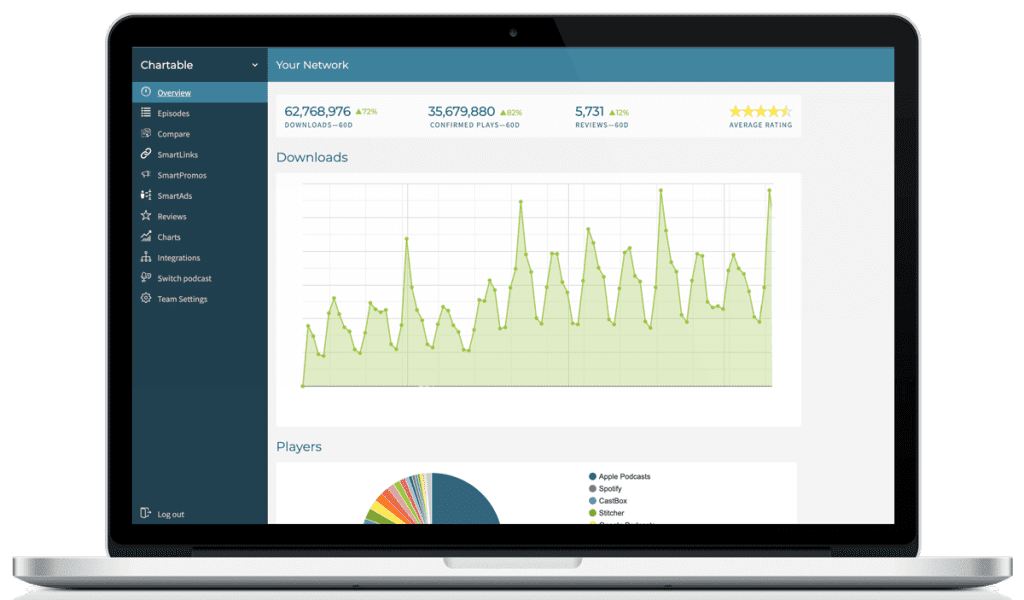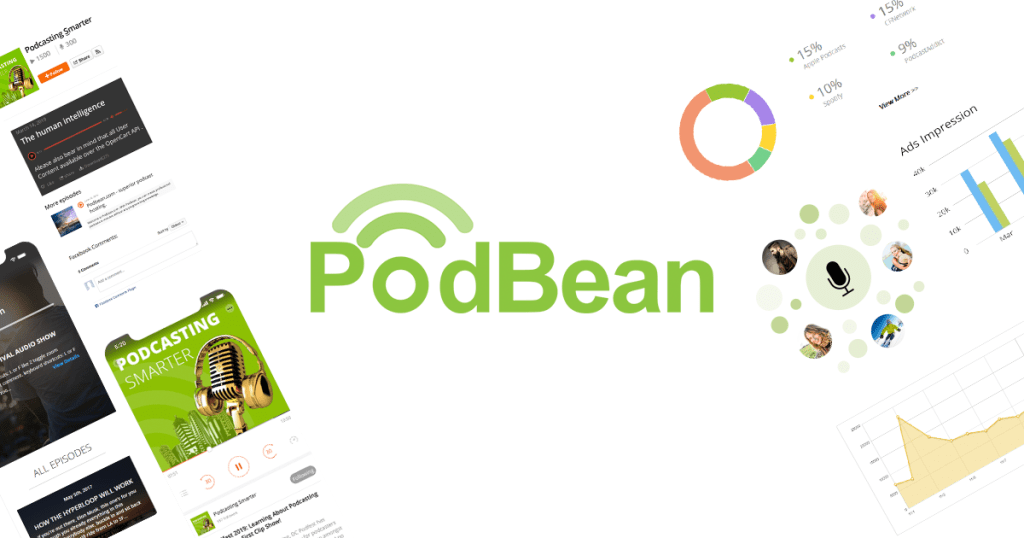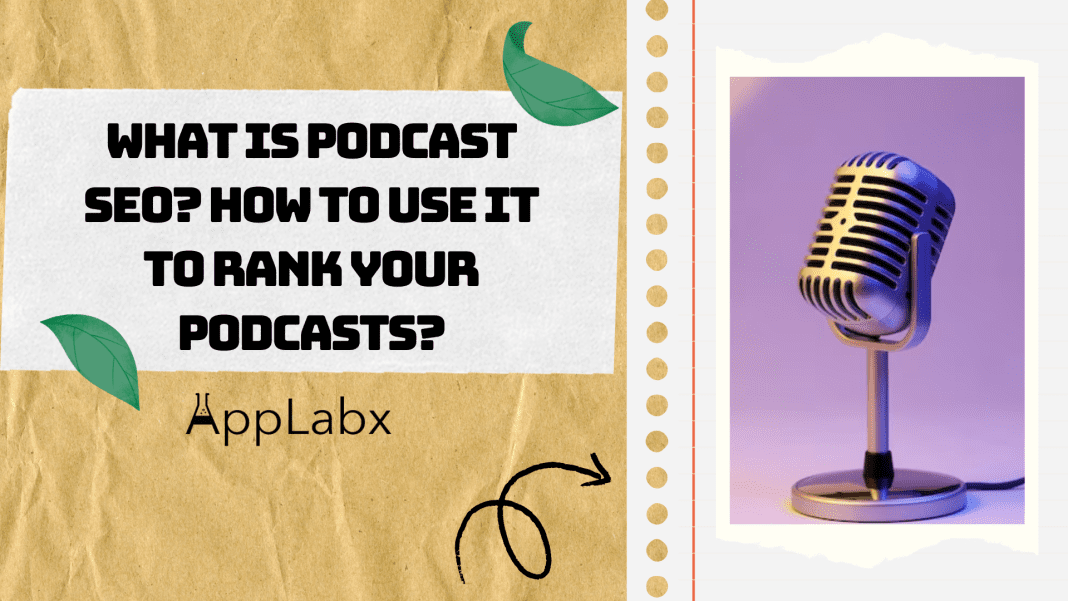Key Takeaways
- Strategic Optimization Elevates Visibility: Uncover the power of Podcast SEO to strategically position your content, ensuring it stands out in the vast podcasting landscape.
- Harmonize Consistency for Audience Retention: Consistent publishing isn’t just a rhythm—it’s the heartbeat of listener retention. According to Chartable, maintaining a regular schedule enhances engagement.
- CTAs: The Crescendo of Audience Engagement: Calls-to-action orchestrate active engagement. Craft compelling CTAs tailored to your goals, propelling your podcast into the forefront of the digital soundscape.
Welcome to the dynamic realm of podcasting, where the auditory landscape is continuously evolving, and listeners crave engaging content.
In this vast auditory universe, crafting compelling podcasts is an art, but ensuring they reach the right audience is a science – and that’s where Podcast SEO steps onto the stage.
Podcast SEO, an indispensable facet of the modern content creator’s toolkit, serves as the catalyst for catapulting your podcasts to the summit of search results, ensuring they don’t merely resonate with your audience but are discovered by them.
In this comprehensive guide, we embark on a journey through the intricacies of Podcast SEO, unravelling its nuances, and arming you with the knowledge to strategically ascend the ranks in the fiercely competitive podcasting landscape.

The Essence of Podcast SEO
Before delving into the “how,” let’s demystify the “what” of Podcast SEO.
Simply put, Podcast SEO involves the strategic optimization of your podcast content to enhance its visibility in search engine results.
It’s the compass guiding your content through the labyrinth of algorithms, ensuring that your podcasts not only captivate listeners but also stand out amidst the vast sea of digital audio.
The Imperative of Ranking
“Why does my podcast need to rank?” you may wonder.
Imagine this: you’ve meticulously crafted an episode and poured your heart and soul into its content, but it’s akin to a hidden gem buried in the depths of the internet, waiting to be unearthed.
Podcast SEO is the beacon that illuminates this hidden treasure, directing listeners to your doorstep and placing your content on the digital map.
Navigating the Podcasting Landscape
As the podcasting ecosystem expands exponentially, Podcast SEO emerges as the linchpin of success.
It’s not just about creating exceptional content – it’s about ensuring that content reaches the right ears.
Whether you’re a seasoned podcaster or just dipping your toes into the sonic waters, understanding and harnessing the power of Podcast SEO is pivotal for carving your niche.
Keywords: The Building Blocks
At the heart of Podcast SEO lies the strategic use of keywords.
Unearthing the right keywords is akin to finding the perfect melody for your podcast.
We’ll delve into the tools and techniques for keyword research, unravelling the art of seamlessly integrating them into your podcast titles, descriptions, and episode metadata.
Metadata Magic
Metadata, the unsung hero of podcasting, plays a pivotal role in Podcast SEO. From tags and categories to transcripts and show notes, we’ll explore how to wield metadata effectively, turning it into a powerful ally in your quest for podcast discoverability.
In the subsequent sections, we’ll not only unravel the intricacies of Podcast SEO but also equip you with actionable strategies to elevate your podcasts to the zenith of search engine rankings.
From crafting attention-grabbing titles and descriptions to leveraging analytics for continuous improvement, this guide is your roadmap to podcasting success in the digital era.
But, before we venture further, we like to share who we are and what we do.
About AppLabx
From developing a solid marketing plan to creating compelling content, optimizing for search engines, leveraging social media, and utilizing paid advertising, AppLabx offers a comprehensive suite of digital marketing services designed to drive growth and profitability for your business.
AppLabx is well known for helping companies and startups use SEO to drive traffic to their podcasts.
At AppLabx, we understand that no two businesses are alike. That’s why we take a personalized approach to every project, working closely with our clients to understand their unique needs and goals, and developing customized strategies to help them achieve success.
If you need a digital consultation, then send in an inquiry here.
What is Podcast SEO? How to Use It To Rank Your Podcasts?
- Understanding Podcast SEO
- Why Podcast SEO Matters
- How to Optimize Podcasts for SEO
- Best Practices for Podcast SEO
- Tools and Resources
- Call-to-Action
1. Understanding Podcast SEO
In the vast world of digital audio, understanding the intricacies of Podcast SEO is akin to fine-tuning the frequencies of your content to resonate with search engines and, consequently, your target audience.
Let’s dissect the components of Podcast SEO and explore how each contributes to the overall discoverability of your podcasts.

Definition and Components of Podcast SEO
Keywords in Podcast Titles and Descriptions
Why it Matters: Incorporating relevant keywords in your podcast titles and descriptions is the cornerstone of Podcast SEO.
According to a study, approximately 16 million people in the United States are avid podcast fans, making keyword optimization crucial for reaching this vast audience.
Example: Consider a podcast about personal finance. Instead of a generic title like “Money Matters,” opt for something specific and keyword-rich such as “You Can’t Outrun Your Debt.”
Optimizing Episode Titles and Descriptions
Why it Matters: Individual episodes provide additional opportunities for SEO optimization. Crafting detailed yet concise titles and descriptions ensures that each episode stands out in search results.
Apple Podcasts features more than 2 million free shows, emphasizing the need for precise optimization to stand out.
Example: If your episode discusses “Investing Strategies for Beginners,” ensure the title and description explicitly convey this, using relevant keywords to attract listeners interested in introductory investment advice.
Importance of Metadata
Tags and Categories
Why it Matters: Properly categorizing your podcast and using relevant tags helps platforms understand its content, improving its visibility.
Example: If your podcast falls under the “Business” category, ensure it’s accurately tagged with relevant subcategories such as “Entrepreneurship” or “Finance.”
Transcripts and Show Notes
Why it Matters: Transcripts not only enhance accessibility but also serve as valuable SEO assets.
Search engines can crawl and index text, boosting the discoverability of your podcast.
Example: Including detailed show notes and transcripts for each episode allows search engines to understand the context and content, increasing the likelihood of your podcast appearing in relevant search results.
2. Why Podcast SEO Matters
Understanding the profound impact of Podcast SEO is not just a matter of technical know-how; it’s a strategic imperative for any podcaster aspiring to carve a niche in the ever-expanding auditory realm.
This section will unravel the significance of Podcast SEO, backed by relevant data and examples that underscore its pivotal role in the success of your podcast.

Increased Visibility and Discoverability
The Sea of Digital Content
Why it Matters: With over 2 million podcasts available, according to Apple, the competition for listener attention is fierce. Achieving visibility in this vast sea is essential for attracting your target audience.
Search Engine Dominance
Why it Matters: A significant portion of podcast discovery happens through search engines.
Example: A well-optimized podcast on personal development is more likely to surface in search results when a user queries “self-improvement podcasts,” leading to increased visibility among individuals actively seeking such content.
Attracting Targeted Audiences
The Power of Intentional Searches
Why it Matters: Podcast SEO enables you to attract an audience genuinely interested in your content.
Tailoring your optimization efforts to align with specific keywords ensures that your podcast reaches those actively seeking topics within your niche.
Example: If your podcast revolves around health and wellness, optimizing for keywords like “mindfulness exercises” or “nutrition tips” can draw in listeners passionate about these subjects.
Competing in the Podcasting Landscape
Standing Out in the Crowd
Why it Matters: Podcast SEO isn’t just about visibility; it’s about differentiation. With the proliferation of podcasts, standing out is crucial for capturing and retaining listener attention.
Example: An intricately optimized podcast on technology trends doesn’t just aim to be seen; it aspires to be the go-to source for tech enthusiasts, carving a distinctive space in a crowded landscape.

3. How to Optimize Podcasts for SEO
Now that we’ve established the significance of Podcast SEO, let’s dive into the actionable strategies and techniques that can elevate your podcasts to the zenith of search engine rankings.
This section will guide you through the nuanced process of optimizing your podcast content, ensuring it not only captivates your audience but is also discoverable by search engines.

Researching Relevant Keywords
Tools for Keyword Research
Why it Matters: Identifying the right keywords is foundational to effective podcast optimization.
Leverage keyword research tools such as Google Keyword Planner, Ahrefs, or Ubersuggest to uncover terms relevant to your podcast niche.
Choosing Appropriate Keywords for Podcasts
Why it Matters: Opt for keywords with a balance of search volume and relevance to your content. Specific and niche keywords can often yield better results in attracting your target audience.
Example: For a podcast centred around sustainable living, keywords like “eco-friendly lifestyle tips” or “zero-waste living” can be more effective than generic terms like “green living.”
Crafting Compelling Titles and Descriptions
Writing Descriptive and Engaging Titles
Why it Matters: Titles serve as the first point of contact with potential listeners. Craft titles that are not only keyword-rich but also intriguing and indicative of your episode’s content.
Example: Instead of a title like “Productivity Hacks,” consider “Supercharge Your Day: Proven Productivity Hacks for Peak Performance.”
Utilizing Keywords Naturally
Why it Matters: Keyword stuffing can harm your podcast’s credibility. Integrate keywords naturally within titles and descriptions, ensuring a seamless reading experience for both algorithms and human users.
Example: If your episode discusses “Healthy Recipes for Busy Professionals,” naturally incorporate phrases like “quick meals” and “nutrition tips” without compromising readability.
Leveraging Metadata for Optimization
Strategic Use of Tags and Categories
Why it Matters: Platforms like Apple Podcasts and Spotify use tags and categories to categorize and recommend content. Accurate tagging enhances your podcast’s discoverability within specific genres.
Example: If your podcast falls under the “Technology” category, consider additional tags like “Artificial Intelligence” or “Cybersecurity” to refine its categorization.
Enhancing Discoverability through Transcripts
Why it Matters: Providing transcripts not only aids accessibility but also offers a wealth of text for search engines to index. This can significantly boost your podcast’s visibility in search results.
Example: Including detailed transcripts for interviews or discussions on niche topics allows search engines to understand the content comprehensively, improving the likelihood of appearing in relevant searches.
4. Best Practices for Podcast SEO
Now that we’ve laid the groundwork for understanding and optimizing podcasts for SEO, let’s explore the best practices that can amplify the impact of your efforts, ensuring sustained visibility and resonance in the competitive world of digital audio.

Consistency in Publishing
Establishing a Regular Schedule
Why it Matters: Consistency in publishing is key to building and retaining an audience.
Example: If your podcast releases episodes every Monday, listeners come to anticipate and look forward to new content, enhancing engagement and loyalty.
Optimizing Episode Length
Why it Matters: Over 50% of podcasts are between 20 and 60 minutes. However, the ideal length may vary based on your target audience and content type.
Example: For a podcast on daily news updates, shorter episodes may be more suitable, while in-depth interviews or storytelling might warrant longer formats.
Promoting on Various Platforms
Cross-Platform Promotion
Why it Matters: Promoting your podcast across multiple platforms broadens your reach.
Example: Beyond major platforms like Apple Podcasts and Spotify, explore niche directories and platforms related to your podcast’s genre or theme.
Leveraging Social Media
Why it Matters: Social media is a powerful tool for promotion.
Example: Share snippets, behind-the-scenes content, and engaging visuals on platforms like Instagram, Twitter, and Facebook to captivate your audience and drive traffic to your podcast.
Encouraging Audience Engagement
Call-to-Action in Episodes
Why it Matters: Actively engage your audience by including calls-to-action within your episodes. Encouraging listeners to subscribe, leave reviews, or visit your website can boost your podcast’s visibility.
Example: Prompt listeners with a call-to-action like “If you enjoyed this episode, don’t forget to subscribe and leave a review on your preferred platform.”
Building a Community
Why it Matters: A dedicated listener community fosters organic growth.
Example: Create a Discord server, Facebook group, or other community spaces where listeners can connect, share insights, and actively participate in discussions related to your podcast.
Monitoring Analytics and Making Adjustments
Utilizing Podcast Analytics Tools
Why it Matters: Regularly monitoring analytics provides insights into audience behaviour. Platforms like Chartable, Podbean, and Libsyn offer detailed analytics to help you understand listener demographics, popular episodes, and more.
Example: If analytics reveal a drop in engagement during specific segments, consider adjusting your content strategy to better align with listener preferences.
5. Tools and Resources
Embarking on a journey to optimize your podcast for SEO requires a toolkit equipped with cutting-edge resources.
In this section, we’ll explore a myriad of tools designed to enhance discoverability, analyze performance, and streamline the overall SEO process for your podcast.

SEO Tools for Podcasters
Google Keyword Planner
Why it Matters: Unearth valuable keywords using Google Keyword Planner, a free tool that provides insights into keyword search volumes and competition levels.
Example: Identify high-performing keywords related to your podcast niche to optimize titles, descriptions, and metadata effectively.
Ahrefs
Why it Matters: Ahrefs is a comprehensive SEO tool that not only aids in keyword research but also offers insights into competitor strategies, backlink analysis, and content optimization.
Example: Use Ahrefs to analyze competitors’ podcasts, understand trending topics, and refine your content strategy for maximum impact.
Ubersuggest
Why it Matters: Ubersuggest is a versatile tool that provides keyword ideas, content suggestions, and insights into competitor strategies. Leverage its features to refine your podcast SEO approach.
Example: Uncover long-tail keywords specific to your podcast content, enhancing its visibility in niche searches.
Platforms and Plugins for Podcast SEO
Chartable
Why it Matters: Chartable offers podcast analytics and attribution, helping you understand audience behavior, track performance, and optimize your content strategy.
Example: Utilize Chartable to track the impact of your promotional efforts and identify episodes that resonate most with your audience.

Podbean
Why it Matters: Podbean is an all-in-one podcasting platform that provides analytics, hosting, and promotional tools. Its SEO-friendly features contribute to improved podcast visibility.
Example: Leverage Podbean’s SEO features, including episode transcriptions and customizable podcast websites, to enhance overall SEO performance.

Libsyn (Liberated Syndication)
Why it Matters: Libsyn is a prominent podcast hosting platform with robust analytics, distribution capabilities, and a user-friendly interface.
Example: Use Libsyn’s analytics to gain insights into listener demographics and tailor your content to match the preferences of your target audience.
Further Reading and Learning Opportunities
Podcast SEO Guides and Tutorials
Why it Matters: Continuously educate yourself on evolving SEO strategies. Platforms like Moz and HubSpot offer comprehensive guides and tutorials specific to podcast SEO.
Example: Explore Moz’s guide for in-depth insights into optimizing your podcast for search engines, and staying ahead of industry trends.
SEO Communities and Forums
Why it Matters: Engage with SEO communities like Reddit, r/SEO, or forums like Moz Community to exchange ideas, seek advice, and stay updated on the latest SEO trends.
Example: Participate in discussions on r/SEO to share your experiences and learn from the successes and challenges of fellow podcasters.
6. Call-to-Action
The journey through podcast SEO isn’t complete without understanding the strategic deployment of calls-to-action (CTAs).
In this section, we’ll explore the importance of CTAs, backed by data, and delve into examples that illustrate how compelling calls-to-action can elevate your podcast engagement and visibility.

Encouraging Listeners to Take Action
The Power of Prompting
Why it Matters: Calls-to-action serve as catalysts for audience engagement, prompting listeners to take specific actions such as subscribing, leaving reviews, or visiting your website.
According to a study, a staggering 81% of listeners have taken action after hearing audio ads during a podcast episode, highlighting the efficacy of well-placed CTAs.
Building a Relationship Beyond Listening
Why it Matters: CTAs go beyond immediate actions; they contribute to building a relationship with your audience. Consistent engagement fosters a sense of community and loyalty.
Example: Encourage listeners to follow your podcast on social media, creating an ongoing connection beyond the podcast episodes.
Crafting Effective Calls-to-Action
Tailoring CTAs to Your Goals
Why it Matters: Different podcasts have different objectives. Whether it’s growing subscribers, increasing website traffic, or generating revenue, tailor your CTAs to align with your overarching goals.
Example: If your goal is to boost website traffic, include a CTA like “Visit our website for additional resources and exclusive content.”
Clarity and Simplicity
Why it Matters: CTAs should be clear and easy to understand. Avoid ambiguity, ensuring that listeners grasp the intended action effortlessly.
Example: Instead of a vague CTA like “Check us out,” opt for clarity with “Subscribe for weekly insights and updates.”
Subscription and Sharing Prompts
The Impact of Subscriptions
Why it Matters: Subscriptions are a crucial metric for podcast success. Platforms like Apple Podcasts prioritize podcasts with higher subscription rates in their recommendations.
Example: Include CTAs like “Subscribe for a weekly dose of inspiration” to drive more listeners to become regular subscribers.
Amplifying Reach Through Sharing
Why it Matters: Encouraging listeners to share your podcast extends your reach organically. According to Nielsen, the most credible form of advertising comes directly from people we know and trust.
Example: Implement CTAs like “If you enjoyed this episode, share it with a friend who needs to hear this” to leverage the power of word-of-mouth advertising.
Measurement and Optimization
Tracking CTA Performance
Why it Matters: Use analytics tools to track the performance of your CTAs. Platforms like Chartable and Podbean provide insights into listener behavior and engagement.
Example: Monitor the impact of CTAs by analyzing the increase in subscribers or website traffic after implementing specific calls-to-action.
A/B Testing for Refinement
Why it Matters: A/B testing different CTAs allows you to refine your approach based on what resonates most with your audience.
Example: Experiment with variations of CTAs and measure their performance to identify the most effective prompts for your audience.
Conclusion
Congratulations on embarking on the enriching journey of understanding and implementing Podcast SEO – the symphony that orchestrates the harmonious interplay between your captivating content and the algorithms that guide listeners to your digital stage.
As we conclude this comprehensive guide, let’s reflect on the key insights, actionable strategies, and the transformative potential of Podcast SEO.
Unveiling the Essence of Podcast SEO
Podcast SEO isn’t a mere concept but a dynamic practice that bridges the gap between your creative endeavors and the vast digital landscape. It transforms your podcast from an echo in the wilderness to a resonant melody heard by the right audience.
The components of Podcast SEO, from keywords and metadata to consistent publishing, are the building blocks of your digital resonance. Each element contributes to the clarity of your podcast’s voice amid the cacophony of the online world.
Navigating the Podcasting Landscape
The podcasting landscape is akin to an ocean, vast and teeming with content.
Podcast SEO is your compass, guiding your content through the waves and ensuring it doesn’t merely float but sails to the forefront.
Understanding the importance of Podcast SEO equips you not just to compete but to excel. It positions your podcast as a distinct note in the symphony, drawing the attention of your intended audience.
Crafting a Symphony with Best Practices
Consistent publishing is the heartbeat of your podcast, maintaining the rhythm that keeps your audience engaged.
Cross-platform promotion orchestrates a harmonious blend of visibility. Utilizing various platforms and leveraging social media creates a resonance that reverberates far beyond the auditory realm.
The Power of Strategic Tools and Resources
Tools like Google Keyword Planner, Ahrefs, and platforms like Chartable and Podbean serve as the instruments through which you fine-tune your podcast for optimal resonance. These tools aren’t just aids; they’re partners in your journey.
The learning opportunities provided by SEO guides, tutorials, and vibrant communities aren’t a footnote; they’re the crescendo that propels your podcast to new heights. Staying informed is the melody that never fades.
The Symphony of Calls-to-Action
CTAs are the crescendos within your podcast, prompting listeners to engage actively. Whether it’s subscribing, sharing, or visiting your website, these prompts are the applause that signifies a connection beyond listening.
Tracking the performance of CTAs and refining them through A/B testing is the ongoing refinement that ensures your podcast continues to resonate and evolve in tune with audience preferences.
In the Echoes of Tomorrow
As you venture forth with the knowledge gained from this guide, envision your podcast not merely as an auditory creation but as a living, evolving entity in the digital soundscape.
Podcast SEO isn’t a one-time tune-up; it’s a continuous composition that adapts, refines, and resonates with the ever-changing dynamics of the online world.
Remember, the echoes of your podcast have the potential to reverberate through time, reaching audiences you may have never imagined.
With strategic SEO practices, compelling content, and an unwavering commitment to refinement, your podcast has the power to orchestrate a symphony that captivates hearts, transcends boundaries, and creates a lasting impact in the vast realm of digital audio.
So, let your podcast be more than just sound waves; let it be a resonant force that leaves an indelible imprint on the ears, minds, and hearts of those who tune in.
May your journey in the podcasting landscape be marked by continuous growth, unwavering resonance, and the joy of seeing your creation find its place in the grand symphony of the digital age.
If you are looking for a top-class digital marketer, then book a free consultation slot here.
If you find this article useful, why not share it with your friends and business partners, and also leave a nice comment below?
We, at the AppLabx Research Team, strive to bring the latest and most meaningful data, guides, and statistics to your doorstep.
To get access to top-quality guides, click over to the AppLabx Blog.
People also ask
What is podcast SEO?
Podcast SEO is the art of optimizing your podcast’s digital presence to enhance discoverability in search engines. It involves the strategic use of keywords, metadata, and promotional techniques to elevate your podcast’s ranking, attract a targeted audience, and maximize visibility in the competitive world of digital audio.
How do I rank my podcast?
To rank your podcast, leverage Podcast SEO strategies. Optimize titles and descriptions with relevant keywords, use accurate metadata, consistently publish high-quality content, promote on various platforms, encourage audience engagement, and measure performance using analytics tools.
How do I optimize my podcast for SEO?
Optimize your podcast for SEO by researching relevant keywords, incorporating them naturally into titles and descriptions, using accurate metadata, transcribing episodes for search engines, promoting on diverse platforms, and fostering audience engagement through effective calls-to-action.




































